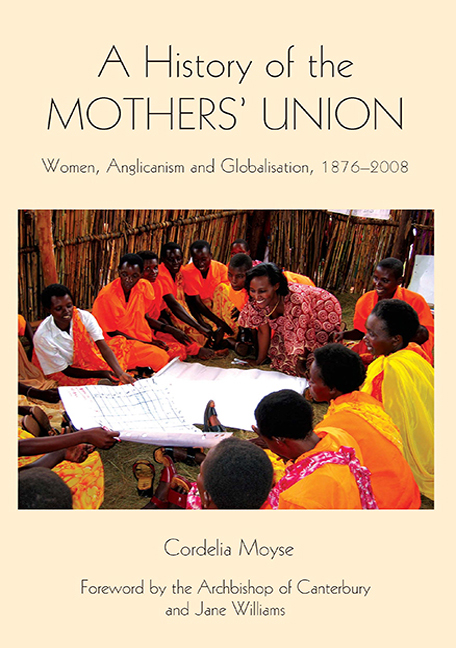Book contents
- Frontmatter
- Contents
- Dedication
- List of Illustrations
- Foreword by the Archbishop of Canterbury and Jane Williams
- Acknowledgements
- Abbreviations
- Introduction
- Part I 1876–1909
- Part II 1910–1944
- Part III 1945–1974
- Part IV 1975–2008
- 11 Mission and Spirituality in a Global Age
- Conclusion
- Appendix 1 Text of early membership cards
- Appendix 2 Development of the Mothers' Union prayer
- Appendix 3 Midday prayers (original)
- Appendix 4 Development of the objects
- Appendix 5 Biographical notes on central and worldwide presidents
- Bibliography
- Index
- Miscellaneous Endmatter
11 - Mission and Spirituality in a Global Age
from Part IV - 1975–2008
Published online by Cambridge University Press: 29 April 2017
- Frontmatter
- Contents
- Dedication
- List of Illustrations
- Foreword by the Archbishop of Canterbury and Jane Williams
- Acknowledgements
- Abbreviations
- Introduction
- Part I 1876–1909
- Part II 1910–1944
- Part III 1945–1974
- Part IV 1975–2008
- 11 Mission and Spirituality in a Global Age
- Conclusion
- Appendix 1 Text of early membership cards
- Appendix 2 Development of the Mothers' Union prayer
- Appendix 3 Midday prayers (original)
- Appendix 4 Development of the objects
- Appendix 5 Biographical notes on central and worldwide presidents
- Bibliography
- Index
- Miscellaneous Endmatter
Summary
The MU was virtually born again in 1974. Its new constitution gave it five new objects through which it was to express its mission to marriage and family life. For members in the British Isles 1974 marked the official end of the MU's 80-year obsession with a ‘pure’ membership engaged in resisting all divorce. Instead the MU took on a new pastoral commitment to supporting people whatever their domestic situation rather than seeking to impose one model of the ideal relationship. For members across the world the MU created its own post-colonial era, with overseas MU councils having the opportunity to manage their own affairs in the light of their own national and local circumstances.
While the 1974 constitution set new goals for the organisation it did not prescribe how they were to be achieved. This was a blessing when in the course of the next 30 years the MU had to navigate further immense social and economic changes in Western countries as well as developments within the Anglican Communion. In the UK and across the developed world there was a fundamental shift in behaviour around marriage and family formation. At the same time ordinary people across the world experienced the impact of globalisation through such things as the internet, cheap air travel, the mobile phone and the international commitment to eradicate extreme poverty via the United Nation's Millennium Development Goals. Equally important to the MU's development from the 1970s onwards were the consequences of the shifts in global Christianity for an international mass membership organisation. With the Western decline in both believing in and belonging to Christian bodies, and Christianity's phenomenal numerical growth in the so-called Global South, the MU was challenged to reappraise its own identity and formal structures. The growth of the Anglican Communion in the southern hemisphere has not only brought millions to membership in the MU but has altered the relationship between the churches of the northern and southern hemispheres. One of the consequences of this has been the deep conflict surrounding homosexuality, which is itself the presenting ethical issue through which long-simmering issues of biblical and ecclesial authority, canon law and the nature of communion have boiled over within the Anglican Church.
- Type
- Chapter
- Information
- A History of the Mothers' UnionWomen, Anglicanism and Globalisation, 1876–2008, pp. 223 - 244Publisher: Boydell & BrewerPrint publication year: 2009



